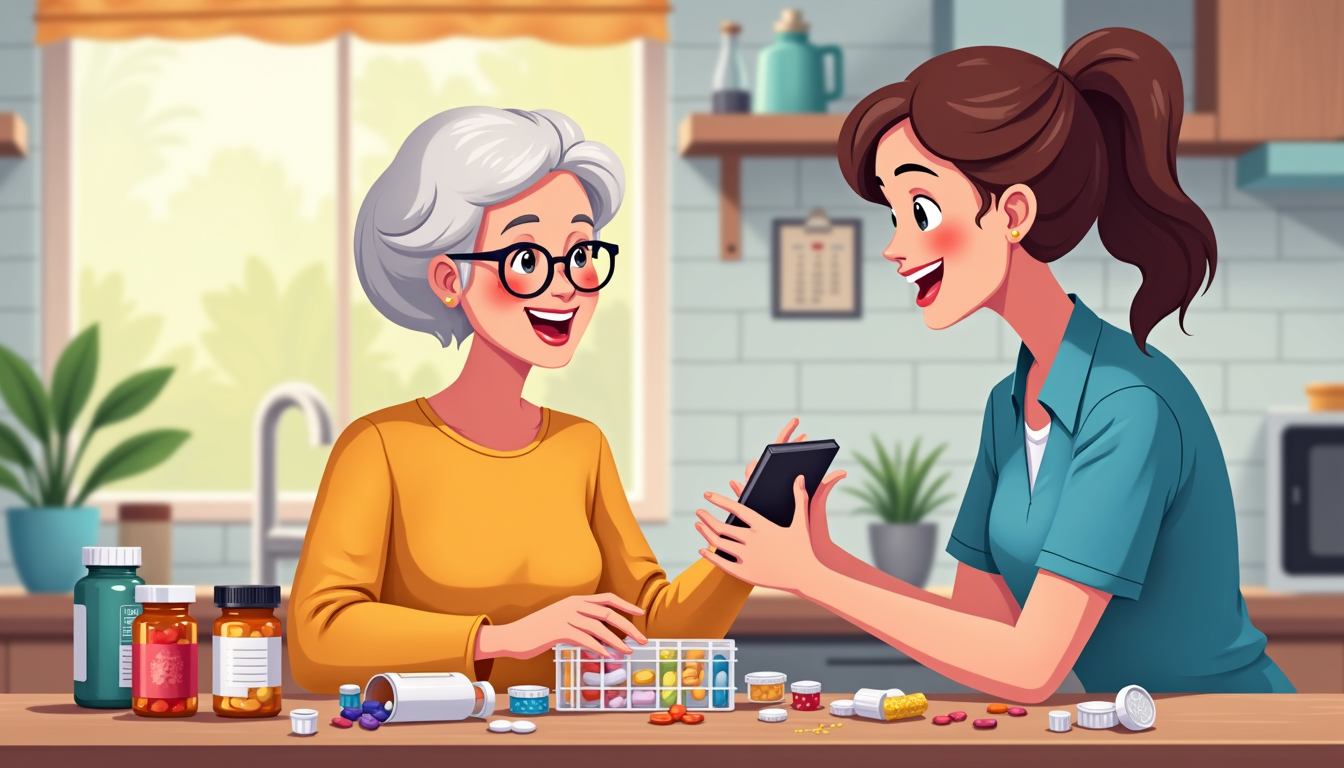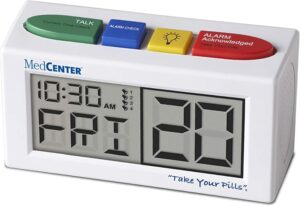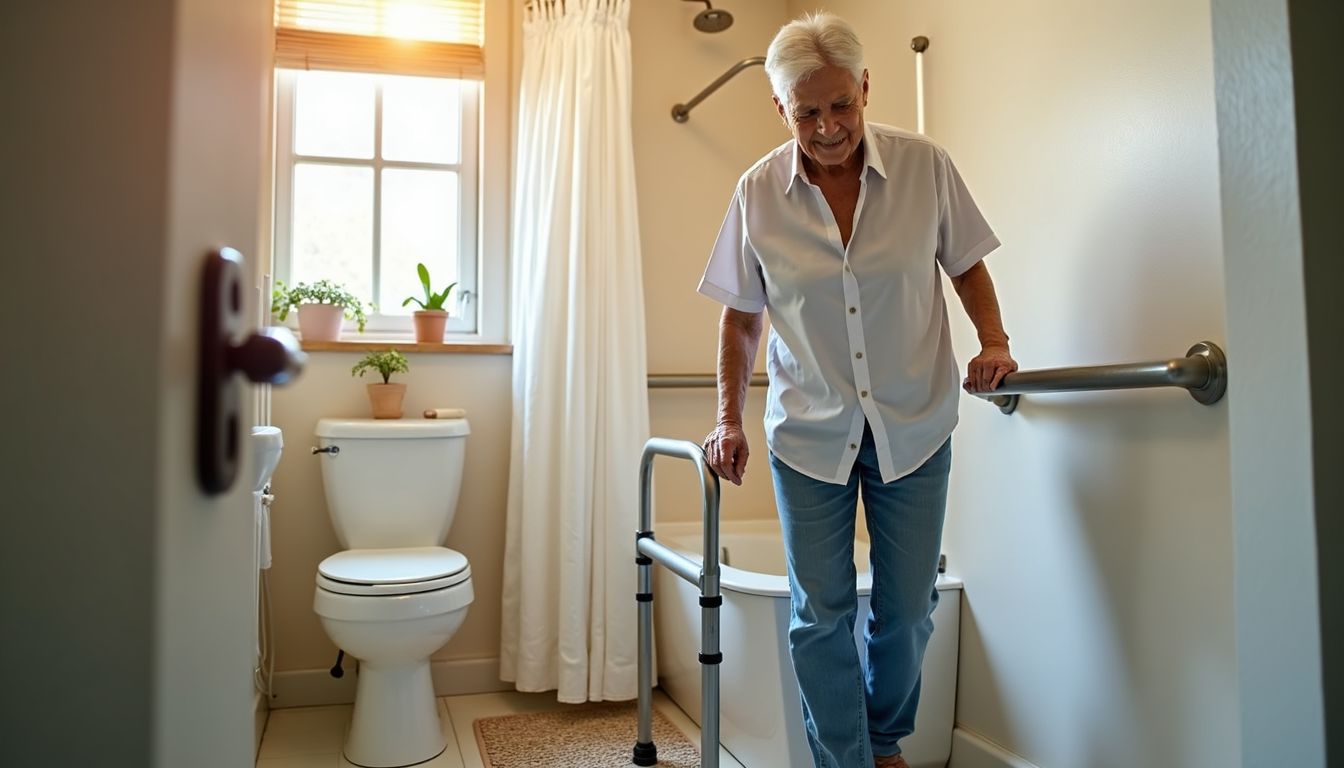🩺 Introduction
Medication safety tips for elderly are essential as managing multiple medications becomes a daily reality for many seniors. From prescriptions for chronic conditions to vitamins and supplements, keeping track of what to take and when can be confusing. Missing a dose, taking a double dose, or mixing up the wrong pills can quickly lead to serious health problems.
That’s why following simple habits and using the right tools can make a big difference — helping seniors take their medications correctly, stay healthy, and maintain independence.”
In this guide, we’ll share 10 essential medication safety tips designed specifically for older adults and caregivers. Whether you’re managing your own prescriptions or helping a loved one, these practical steps will help you stay organized, avoid common mistakes, and ensure every dose supports better health and peace of mind.
💊 Why Medication Safety Matters for Seniors

Medication plays a huge role in maintaining good health as we get older. Seniors often take multiple prescriptions to manage conditions like high blood pressure, diabetes, arthritis, or heart disease. However, juggling many pills at different times can easily lead to confusion and mistakes.
Even a small error — such as missing a dose or taking the wrong medication — can cause dizziness, fatigue, or serious side effects. In some cases, it can lead to hospitalization or long-term complications.
That’s why medication safety tips for elderly individuals aren’t just helpful — they’re essential. Good medication management helps:
-
✅ Prevent dangerous drug interactions
-
✅ Avoid missed or double doses
-
✅ Reduce hospital visits caused by medication errors
-
✅ Improve overall health and independence
When seniors and caregivers follow safe medication practices, it brings peace of mind knowing that every pill taken supports better living — not risk.
🩺 10 Essential Medication Safety Tips for Elderly

Managing medications can feel overwhelming, but following these practical tips can make it simple and safe for seniors.
1. Keep a Complete Medication List
Always maintain a detailed list of all prescriptions, supplements, and vitamins, including dosage and timing. Share this list with your doctor or pharmacist regularly to prevent dangerous interactions and ensure safe care.
2. Use a Pill Organizer
A pill organizer is a simple yet powerful tool for seniors. By sorting medications by day and time, it helps avoid missed doses or accidental double dosing. For more details, check out our guide on What is a Pill Organizer?.
3. Set Up a Pill Reminder Device
For seniors with busy schedules or memory challenges, a pill reminder device can be a lifesaver. Smart alarms, talking pill boxes, or app-connected devices ensure you take your medications on time. See our review of the Best Pill Reminder Devices for Seniors for some top options.
4. Store Medications Safely
Keep medicines in a cool, dry place away from moisture and sunlight. Avoid storing pills in bathrooms, and always ensure they are out of reach of children or pets.
5. Follow the Correct Dosage and Timing
Read labels carefully and take medications exactly as prescribed. Never double up on a dose if one is missed without consulting your healthcare provider.
6. Avoid Mixing Medications Without Doctor Advice
Some medications or supplements can interact dangerously with each other. Always consult your doctor or pharmacist before adding new medications to your routine.
7. Use Clear Labels and Large Print
For seniors with vision challenges, clear labels and large-print instructions make medication management easier and safer.
8. Coordinate with One Pharmacy
Filling all prescriptions at the same pharmacy helps track medications and prevents dangerous interactions. Pharmacists can also alert you to any conflicting drugs.
9. Schedule Regular Medication Reviews
Ask your doctor or pharmacist to review your medications regularly. This helps remove unnecessary prescriptions and ensures all medications are still appropriate.
10. Educate Caregivers and Family Members
Caregivers play a crucial role in medication safety. Keep them informed about schedules, side effects, and proper storage. For more tips on supporting seniors, see our guide on Help Elderly Manage Medications.
⚠️ Common Medication Mistakes to Avoid

Even small errors in medication management can have serious consequences for seniors. Being aware of these common mistakes can help prevent problems and keep health on track:
1. Skipping Doses
Many seniors accidentally skip medications due to forgetfulness or busy schedules. Using a pill organizer or pill reminder device can help ensure every dose is taken on time.
2. Taking Expired Medications
Expired pills can lose effectiveness or even become harmful. Regularly check expiration dates and safely dispose of outdated medications.
3. Confusing Similar-Looking Pills
Some medications look alike, which can lead to taking the wrong pill. Using clearly labeled 7 Day Pill Organizers or weekly pill trays can prevent mix-ups.
4. Ignoring Doctor Instructions
Taking medications without following your doctor’s instructions or altering doses on your own can be dangerous. Always consult healthcare professionals before making changes.
5. Storing Medications Improperly
Humidity, heat, or sunlight can affect medication stability. Avoid storing pills in bathrooms or near kitchen stoves. Use a cool, dry, and secure place.
By being mindful of these mistakes and using tools like AUVON iMedassist 7 Day Pill Organizer, seniors can manage medications safely, reduce stress, and maintain their independence.
👵👴 How Caregivers Can Help Seniors Manage Medications

Caregivers play a vital role in ensuring seniors take their medications safely and consistently. With a few simple strategies, they can make medication management easier and stress-free:
1. Organize Medications in a Weekly Pill Box
Caregivers can pre-sort medications into 7 Day Pill Organizers. This makes it easy for seniors to take the right pills at the right time, and helps avoid missed or double doses.
2. Set Up Reminders
Using a pill reminder device or smartphone alarm can help seniors remember each dose, especially if they have memory challenges.
3. Keep a Medication Log
Track each dose taken by writing it down or using a digital tracker. This allows caregivers to quickly check whether a pill was missed or taken late.
4. Monitor for Side Effects
Caregivers should watch for unusual reactions or side effects and report them to the doctor promptly. This is particularly important when starting new medications or changing dosages.
5. Coordinate With Healthcare Providers
Ensure all prescriptions, vitamins, and supplements are shared with the same pharmacy or doctor. This helps prevent drug interactions and keeps the senior’s medication plan organized.
By following these steps, caregivers can significantly reduce medication errors, help seniors maintain their health, and provide peace of mind for the entire family. For more tips on supporting seniors with medications, see our guide on Help Elderly Manage Medications.
✅ Conclusion & Final Tips
Managing medications doesn’t have to be stressful for seniors or caregivers. By following these medication safety tips for elderly, you can reduce the risk of errors, prevent harmful interactions, and maintain better overall health.
Key takeaways:
-
Keep an updated medication list and share it with healthcare providers.
-
Use a pill organizer or 7 Day Pill Organizer to stay on track.
-
Consider pill reminder devices for added support.
-
Educate caregivers and family members to ensure safe and consistent medication management.
For seniors who want to stay independent while safely managing their medications, these simple strategies can make a big difference. You can also explore our other related guides:
Implementing these tips will help seniors take control of their health, avoid mistakes, and enjoy greater peace of mind every day.







